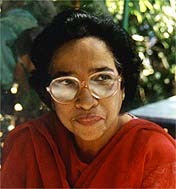There are no memorials built for this courageous lady Nangeli (The beautiful one), nor does her name figure in any history book. But in the village of Cherthala in Kerala, there is an area called Mulachiperambu (Land of women’s breasts), which is popularly known as Manorama Kavala. The exact spot where her hut stood is bare, but surrounded by a patch of green, adjoining a pond. The local people are only too willing to share the story of this brave women to anyone who is willing to listen.
Nangeli and her husband Cherukandan lived in this village in the early 19th century. They belonged to the Ezhava community of low caste toddy tappers. They had no children.
Before the advent of Colonial rule, the women of Kerala went about with bare torsos. It was their way of life and was not considered immoral. But in the 19th century, British missionaries introduced their sense of morality and women began to cover their bare breasts with loose blouses or shawls. Nangeli too believed that she had the right to cover her breasts when she was outdoors.
The Rajah of Travancore was fleecing people with all kinds of taxes to fill his coffers and the poor lower castes suffered the most. A new tax called Mulakkaran (breast tax) was levied on women of the lower castes who wanted to cover their breasts. It was a standard tax not dependent on the size or attractiveness of the breasts.
One day when Nangeli was alone at home, the tax collectors arrived at her house to collect her Breast Tax which was due. These men started leering at the size and shape of her breasts to calculate the Mulakkaram that she should pay. Nangeli told them to wait outside. She went inside, lit a lamp and placed a plantain leaf on the floor and said a quick prayer. Then taking a sharp knife she chopped off both her breasts. She gathered the bloody lumps on the plantain leaf and took them to the tax collectors. Then she fell to the floor and died an agonizing death. The men panicked and ran away. Her husband came home to find Nangeli dead. Cuddling the corpse in his arms and weeping bitterly, Cherukandan jumped into her pyre and perished.
When the Rajah of Travancore heard about this tragic event he was filled with remorse and he scrapped the Breast Tax immediately. Nangeli the brave woman chose death to preserve her honour and dignity. She died in 1803.

